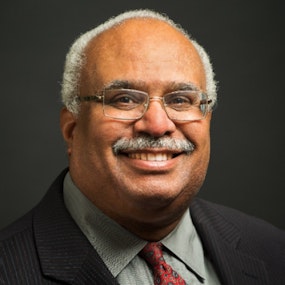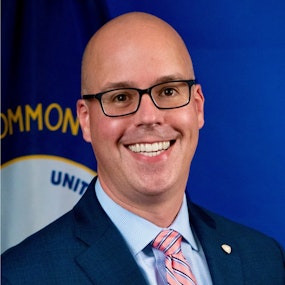ROBERT JOHNSON:
This is the award-winning Public Health Review Morning Edition for Friday, October 27, 2023. I'm Robert Johnson. Now, today's news from the Association of State and Territorial Health Officials.
STEVEN STACK:
We really have to find ways to find common ground so that we can pull in the same direction even though we see the world differently in a lot of important and meaningful ways.
JOHNSON:
Dr. Steven Stack of Kentucky this week becomes ASTHO's 81st president.
STACK:
I really like working with bright, talented people who are really committed to making the world a better place. There's just so many bright and talented people across all public health and one of the great joys has been to work with my fellow state health officials.
JOHNSON:
Stack is the public health commissioner in the Bluegrass State. He assumes the presidency from Alaska Chief Medical Officer Dr. Anne Zink. You can hear more of his interview in Thursday's newscast. ASTHO also issued a news release. You can read it using the link in the show notes.
The American Public Health Association is set to welcome public health leaders in early November to its annual meeting and Expo in Atlanta. APHA Executive Director Dr. Georges Benjamin says the message this year is about overcoming social and ethical challenges.
GEORGES BENJAMIN:
So, this meeting we hope will allow us to think a lot about how best to re-establish trust, and to address some of these ethical challenges that we've had over the last few years.
JOHNSON:
Benjamin notes the agenda includes discussions on some big topics.
BENJAMIN:
We're going to have a on Monday and opening general session which provides for a look at affirmative action. As you know the Supreme Court recently pulled the rug from under affirmative action activity in our educational system, and we're going to have a really sound discussion around that. Then, we're going to close out the meeting with the debate about how to modernize the public health system.
JOHNSON:
The meeting begins November 12. You can get more information by clicking the link in the show notes.
JOHNSON:
Congress has a new Speaker of the House. ASTHO's Carolyn Mullen examines the impact on congressional business and the next federal spending deadline in this week's View from Washington, DC report. Carolyn Mullen, good to have you back here on the newscast. How are you doing today?
CAROLYN MULLEN:
I'm great.
JOHNSON:
I knew you were going to say that because Congress elected a speaker of the House this week.
MULLEN:
Oh, thank goodness, our great national nightmare is over. The house finally elected Speaker Mike Johnson from Louisiana. We're really thrilled that we can move on from this and be open for business. And importantly, President Biden actually issued a request for emergency supplemental funding this week of $56 billion for domestic needs. Included in this emergency supplemental request is $6 billion for disaster aid. Included in there is about 68 million for CDC, and 144 million for SAMSA. In addition to over a billion dollars for addressing the Fentanyl crisis. We're not sure yet if there'll be a high likelihood of this emergency supplemental package moving forward but wanted to share with our viewers that President Biden is asking Congress for $56 billion in the next couple of weeks here.
JOHNSON:
The new speaker obviously will take a look at that and probably have something to say about it. He also already has issued his own list of legislative priorities. Have you taken a look at that?
MULLEN:
Speaker Johnson issued a list of his priorities which indicated that he's open to the possibility of funding the federal government in a short-term continuing resolution through either January or April. It's a really interesting document in terms of that's a priority of the incoming speaker. And he also wants to get back to regular order and passing the remaining appropriations bills which includes the Labor Health and Human Services and Education appropriation bill, which funds NIH, CDC, SAMHSA, HRSA, etc. So, it's an indicator that we will be moving forward in the house, but we can't entirely rule out a government shutdown.
JOHNSON:
I wanted to ask you about that. You're not sure whether we need to worry about a shutdown on November 17.
MULLEN:
That's right. Unfortunately, according to some media reports today, the house is indicating that in order for a short-term CR to be approved, they want a 30% cut from current funding levels. This sets us on a course of collision with the Senate where they will never go for 30% cuts, nor will President Biden. So, still we're responding to some media reports today. But if that is indeed the case, as you can pretty much bank on a government shutdown happening on November 17. I'm really hopeful that it's just a lot of rhetoric right now and people spreading their wings and excitement about the new speaker and wanting to put a line in the sand with their priorities. But a 30% cut for non-defense discretionary spending would just be devastating for the field and you can also bank on it that ASTHO would not be supportive of that kind of cut.
JOHNSON:
And just when we thought it was safe to go outside.
MULLEN:
Right.
JOHNSON:
Carolyn Mullen, we appreciate you as always, thanks for coming on the newscast to give members the latest from Washington, DC. Thanks so much.
Finally, this morning, get the latest news from Capitol Hill and state capitals across the country. When you sign up for ASTHO's legislative alert emails, the link is in the show notes.
Before we go, we'd like to remind you to follow this newscast on your podcast player and asked her on social media. We're on LinkedIn, Twitter, and Facebook.
That'll do it for today. We're back Monday morning with more ASTHO news and information. I'm Robert Johnson. You're listening to the award-winning Public Health Review Morning Edition. Have a great day.







